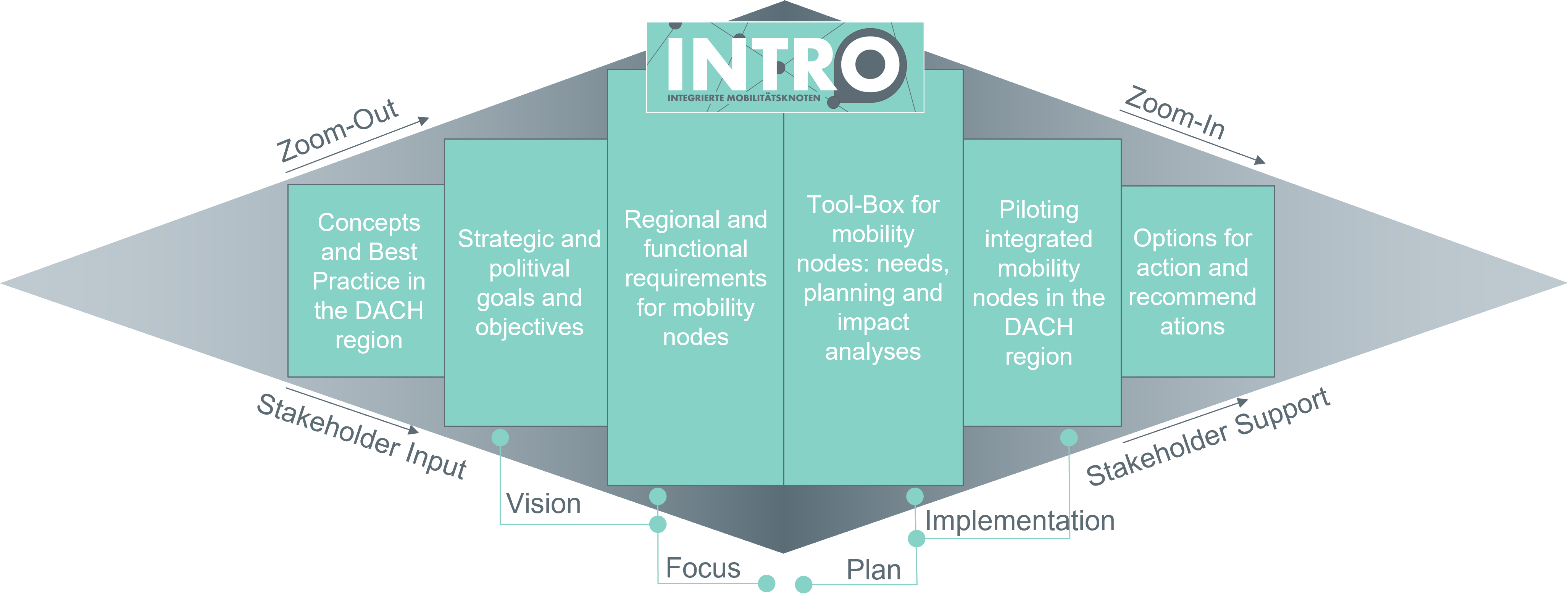Integrated mobility nodes
A fundamental decarbonisation of the transport sector is a huge challenge for politics and society, as well as for transport infrastructure operators and mobility providers on the path to climate neutrality. Technological as well as systemic innovations are essential for a sustainable design of our mobility system and should support sustainable behavioural changes.
Based on previous efforts to enable connected and integrated mobility, numerous Park & Ride, Bike & Ride, and Park & Drive facilities have been created in the DACH region. In previous research, the integration of mobility nodes with regional conditions, the design and function of stations, as well as the assessment of demand and impact of mobility nodes have not been researched very much. To support the planning and operation of sustainable mobility nodes, reliable data sources and supporting methods and tools are required. Currently, only a limited number of tools are available, such as routing and information systems and, in some cases, accessibility calculators, which can be used by stakeholders. Furthermore, the available analyses and data sets are regionally very specific and mostly not transferable to other regions. This requires the collection of applicable tools and the investigation of transferability in the DACH region.
The present project INTRO (Integrierte Mobilitätsknoten) investigates the prerequisites and requirements for effective integrated mobility nodes and the modelling of potential demand for the DACH region. The trinational consortium consisting of the AIT Austrian Institute for Technology (Austria), the Planersocietät PG (Germany) and Rapp AG (Switzerland) is developing a toolbox for planning, demand and impact analyses as well as recommendations for action for the stakeholders in the INTRO project.
The focus here is on mobility nodes as transfer points between private and public transport or also the changeover to new mobility services (NMD), such as sharing and on-demand systems, carpooling and micro-mobility offers. Depending on the spatial and settlement structure and the existing transport infrastructure, e.g. at railway stations and in the near of motorways, there are different requirements for mobility nodes. Based on previous best practice examples and scientific work of the project partners, the requirements for mobility nodes are categorised to make the project results, the developed recommendations based on the potential analyses and pilots, transferable. The INTRO project goals are:
· Objective 1: Analysis of existing and innovative concepts for multimodal mobility nodes in Germany, Austria and Switzerland.
· Objective 2: Identification and categorisation of regional and functional requirements for mobility nodes
· Objective 3: Integration of methods and tools for demand/impact analysis as well as location and network analysis
· Objective 4: Application of the tool box and specific impact assessment in pilot projects
· Objective 5: Development of action options and concrete recommendations for the DACH region
The results of the INTRO project mainly comprise the harmonisation of knowledge, data and tools for mobility nodes in the DACH region. In addition to the prepared set of catalogues and tools, INTRO will provide stakeholders with a harmonised set of rules with options and recommendations for action for the development of integrated mobility nodes as essential elements of innovative and climate-neutral mobility systems of the future.
Funding Tool
The project is fundet within the call for tenders „Mobilitätssystem, Mobilitätssystem, Mobilität 2023: DACH Verkehrsinfrastruktur“. https://projekte.ffg.at/projekt/4906625





